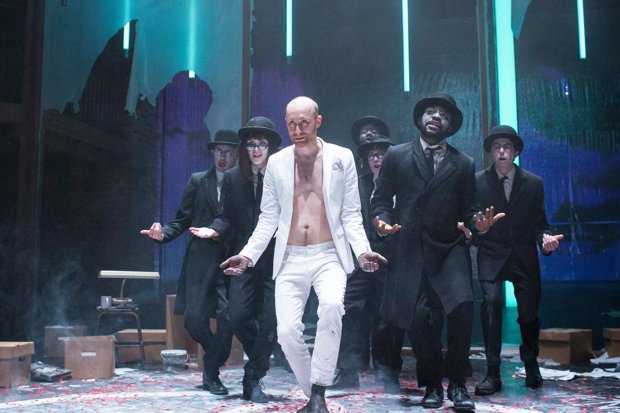Doctor Faustus at the Swan Theatre, Stratford-upon-Avon
reviewed for The Times, 17th February 2016

Sandy Grierson as Faustus in Maria Aberg’s reinvention of the play as a study in modern despair
Helen Maybanks
![]()
Sandy Grierson’s Faustus is the early-career academic’s everyman, though perhaps he’s been to the gym more often. Like most post-docs, he can’t remember why on earth he chose his interminable research project, and racks his files for more stimulating fodder. So Naomi Dawson’s opening set of scattered boxes and papers looks uncannily like my own study halfway through January’s well-intentioned reorganisation of my complete archive of PhD notes. This isn’t so much a scholar luxuriating in precious books as drowning in cheap journal photocopies. A fitting opening for Maria Aberg’s astute reinvention of Doctor Faustus as a study in modern despair.
You might not see Grierson as Faustus, as I did, but catch him playing Mephistophilis instead. Aberg takes as her starting point William Styron’s description of depression as an out-of-body experience, observed dispassionately by “a second self”. Mephistophilis lives inside Faustus’s own head, not a foreign demon, but a dark twin, a doppelgänger. So Grierson and Oliver Ryan double both roles, mirroring each other’s movement. “Why this is Hell, nor am I out of it” is not a theological statement but a mantra of clinical depression. In Aberg’s hands, the play becomes one long suicide note — Faustus cuts his veins, not to seal his contract with the Devil, but to self-harm.
Marlowe’s unfashionable theological concerns are excised — more happily, so are his overburdened scenes of supernatural farce. Aberg is known for her debt to German theatre — she works regularly in Mainz as well as her native Sweden. True to Germanic stereotype, there’s precious little levity here, unless you count the grotesquely tacky parade of the Seven Deadly Sins, which wouldn’t look out of place in one of the less imaginative Frankfurt sex clubs. This is a fetid vision of humanity: fatsuits abound. We even get the obligatory chorus of jack-booted Fascists.
If there’s a shot at redemption, it’s in purity, soiled. Faustus’s dream of beauty gives us Helen of Troy as a slip of a girl — in a slip, literally — with hardened, feral eyes. Yet she’s still clasped in his self-loathing embrace. Soul-scouring theatre.






